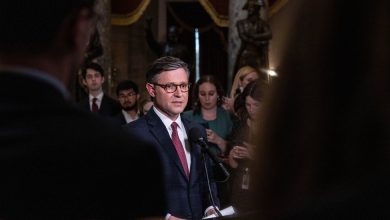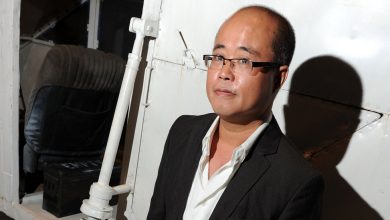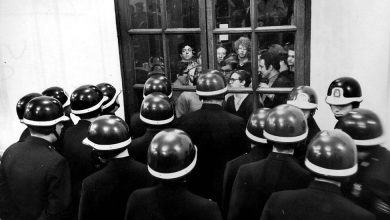Lee Zeldin Captures Republican Primary for N.Y. Governor

ALBANY, N.Y. — Representative Lee M. Zeldin, a four-term congressman from Long Island, won the Republican primary for governor of New York on Tuesday, fending off a spirited challenge in a four-way race, and advancing to a general election where his party hopes to break a two-decade losing streak in statewide races.
Mr. Zeldin, 42, will face Gov. Kathy Hochul, the Democratic incumbent who easily won her primary, and will be seeking a full term in November.
Ms. Hochul has amassed an enormous campaign war chest, and has a large numeric advantage in a deeply Democratic state. But she has suffered from middling poll numbers in recent months amid voters’ concerns about crime and the economy.
Mr. Zeldin was the putative favorite in the primary, having won the backing of state leaders at a convention this winter, held not far from his district. But that imprimatur did not stop three other Republican primary challengers: Rob Astorino, the former Westchester County executive making his second run for governor; Andrew Giuliani, the son of the former New York City mayor Rudolph W. Giuliani; and Harry Wilson, a corporate turnaround specialist.
Each had tried to find a lane to challenge Mr. Zeldin, with Mr. Astorino emphasizing his executive experience, and Mr. Wilson leaning into his economic bona fides. Mr. Giuliani, however, was perhaps the candidate who drew the most attention, a newcomer making his first run for public office, leaning on his father and his experience working for four years in the Trump administration.
On Tuesday, Mr. Zeldin won with 44 percent of the Republican primary vote, with roughly 75 percent of the expected vote counted. He was followed by Mr. Giuliani with 23 percent, about 18 percent for Mr. Astorino and nearly 15 percent for Mr. Wilson. The race was called by The Associated Press about 90 minutes after the polls had closed.
In a speech to supporters on Long Island, Mr. Zeldin promised to break “one-party rule” in Albany, a reference to the Democrats’ domination of both the State Legislature and the governor’s mansion.
“Are we ready to fire Kathy Hochul?” he said, adding that New Yorkers were hitting “their breaking point” on issues like crime and the cost of living. “We aspire for a New York that is restored to glory,” he said.
Fealty to conservative values — and Donald J. Trump — had repeatedly surfaced in the primary campaign. And Mr. Giuliani had openly courted the right-wing vote, voicing belief in Mr. Trump’s baseless claims that he won the 2020 election and promising to emulate the former president, and his father, if elected governor. The primary had little definitive polling, but some surveys had shown Mr. Giuliani running a close second to, or even surpassing, Mr. Zeldin in the closing weeks of the campaign.
In a brief concession speech, Mr. Giuliani struck a conciliatory tone, asking his supporters to back Mr. Zeldin. “This is a movement that is just beginning,” he said.
For his part, Mr. Zeldin had also hewed closely to Mr. Trump’s policies when he was president, going so far as to vote to overturn the results of the 2020 election in key swing states. As a candidate for governor, Mr. Zeldin has somewhat moderated those conservative opinions — voicing skepticism about outlawing abortion in New York, for instance, and giving only muted support to the idea of another Trump candidacy — yet still managed to appeal to the die-hard Republican voters who typically vote in primaries.
The resulting general election campaign will still be an uphill climb for Mr. Zeldin, considering that registered Democratic voters outnumber Republicans by more than two to one in New York. (In pure statistical terms, Republicans are a third party in New York, as they are also outnumbered by nonaffiliated voters.) In order to win in November, Mr. Zeldin will need not only to galvanize his base but also to attract moderate swing voters who may be dissatisfied with Democrats, including President Biden and Ms. Hochul.
No Republican has been elected governor in the state since George Pataki defeated Carl McCall, a Democrat, and a billionaire third-party candidate, Tom Golisano, in 2002. The three most recent contests were easily won by Andrew M. Cuomo, a Democrat who served until his resignation last August.
Mr. Zeldin, who is married with twin daughters, has since 2015 represented the eastern part of Long Island, encompassing a mix of suburban and more rural areas that could be critical in a general election. In 2021, Democrat-backed changes to bail laws, for instance, were potent issues for Republicans on Long Island, leading to a surge of wins in elections in Nassau County, adjacent to Mr. Zeldin’s district.
Results on Tuesday showed that Mr. Zeldin ran very strongly on Long Island, as well as in central and western New York, which could be battlefields in a general election in which neither he or Ms. Hochul hail from New York City.
A precocious legal student — he became a lawyer at 23 — Mr. Zeldin also served in the U.S. Army as an intelligence officer and prosecutor, as well as being deployed to Iraq with the 82nd Airborne in 2006. He still serves in the Army Reserve.
His stump speech included both a raft of policy plans — including allowing fracking, cutting taxes and fighting crime — and a call to arms for his party, saying that he wasn’t in the race simply “to win a primary.”
On Tuesday night, Mr. Zeldin — who took the stage to the sound of DJ Khaled’s “All I Do Is Win” — repeated that sentiment, and called for support from Republicans, independents and “disenfranchised Democrats” in November, while avoiding mentioning Mr. Trump or polarizing social issues like abortion.
“This isn’t just a red wave,” he said. “This is a common-sense wave.”
Jeffery C. Mays contributed reporting.



